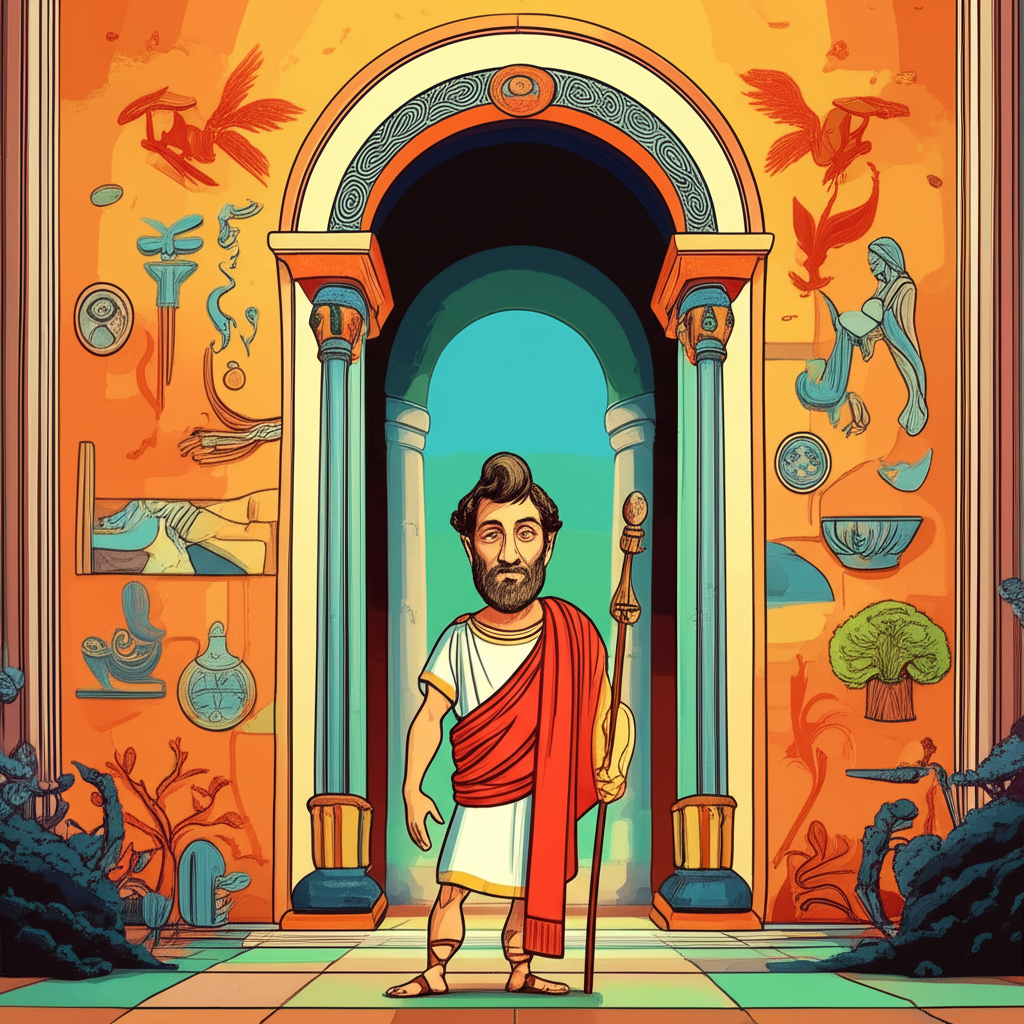The tapestry of human civilization is woven with threads of myth and legend, stories passed down through generations that offer glimpses into the minds and hearts of our ancestors. Among these ancient narratives, the Judgment of Paris stands as a vibrant, dramatic tale, a cornerstone of Greek mythology, originating from the sun-drenched landscapes and sophisticated city-states of ancient Greece. This is not a historical account of verifiable events, nor is it a divine decree. Instead, it is a powerful, imaginative story conceived by the ancient Greeks to explore themes of beauty, desire, power, and the complex nature of human choice.
The world in which these tales took root was one where the gods were not distant, abstract concepts but active participants in the lives of mortals. Ancient Greece, particularly during the Archaic and Classical periods, was a society deeply attuned to the natural world and the forces that seemed to govern it. Earthquakes, storms, the changing seasons, and the very passage of life and death were often attributed to the whims and interventions of a pantheon of powerful deities residing on Mount Olympus. This worldview fostered a rich tradition of storytelling, where myths served as explanations for the inexplicable, as moral compasses, and as entertainment that celebrated human triumphs and exposed human flaws. The epic poems of Homer, the tragedies of Sophocles, and the philosophical inquiries of Plato all engaged with these myths, shaping and reshaping them for new audiences and new understandings. The Judgment of Paris, though perhaps not as universally known as the Trojan War itself, is intrinsically linked to that monumental conflict, acting as a catalyst that set the stage for a decade of heroic struggle and profound loss.
At the heart of this myth lies a figure of celestial beauty, a goddess whose very essence embodies allure and desirability: Aphrodite. In the Greek imagination, Aphrodite was the personification of love, beauty, pleasure, and procreation. She was often depicted as a radiant woman, whose presence could stir the deepest affections and the most fervent desires. Her symbolic attributes were manifold: doves, sparrows, roses, myrtle, and seashells all whispered of her association with gentleness, fertility, and irresistible charm. However, Aphrodite was not merely a passive embodiment of beauty; she was also a formidable force, capable of influencing mortals and immortals alike with her potent influence. Her power lay not in brute strength or divine pronouncements, but in the subtle, yet overwhelming, sway of attraction and longing.
The narrative begins not on Earth, but amidst the divine revelry of Olympus. Peleus, a mortal hero, was marrying the sea nymph Thetis, a union blessed by the gods. However, Eris, the goddess of discord, was conspicuously absent from the guest list. Spurned and harboring a deep resentment, Eris sought to sow chaos. She arrived uninvited, casting a golden apple onto the banquet table, inscribed with the words "Kallisti" – "For the Fairest." This simple, yet potent, act ignited a fierce dispute among the most powerful goddesses: Hera, queen of the gods and wife of Zeus; Athena, goddess of wisdom, warfare, and crafts; and Aphrodite, goddess of love and beauty. Each claimed the apple as rightfully hers, their celestial pride and perceived right to preeminence fueling the discord.
Zeus, wisely recognizing the impossibility of satisfying all three, abdicated the role of judge. Instead, he decreed that the task of resolving this divine quarrel would fall to a mortal prince, Paris, who was living as a shepherd on Mount Ida, unaware of his royal lineage. The three goddesses, each confident in her own supreme beauty, descended to Mount Ida, their divine radiance likely casting an ethereal glow upon the rustic landscape. Imagine the scene: the rugged slopes, the bleating of sheep, and then, the appearance of these immortal beings, each vying for the attention of a humble shepherd.
Hera, with her regal bearing and commanding presence, offered Paris dominion over all of Asia, the power of a mighty king, promising him wealth and earthly authority. Athena, with her sharp intellect and warrior’s spirit, presented him with wisdom and unparalleled skill in battle, the promise of victory and lasting glory. But Aphrodite, with her soft voice and captivating smile, offered something far more personal, something that resonated with the primal desires of a young man. She promised him the love of the most beautiful mortal woman in the world – Helen of Sparta.
Paris, perhaps swayed by the potent allure of love or simply captivated by Aphrodite’s charm, made his choice. He awarded the golden apple to Aphrodite. This decision, seemingly a minor act of arbitration, would have catastrophic consequences. Helen, as legend tells, was already married to Menelaus, the king of Sparta. The goddess’s promise, coupled with Paris’s burgeoning desire, would lead him to Troy, to abduct Helen, and thus ignite the legendary Trojan War, a conflict that would engulf heroes and kingdoms for a decade.
The Judgment of Paris, in its symbolic resonance, offers a profound commentary on the values and perceptions of the ancient Greeks. The choice of the apple, a symbol of temptation and desire, highlights the allure of beauty and love. Hera’s offer of power speaks to the human ambition for control and dominion, while Athena’s promise of wisdom and victory reflects the pursuit of glory and intellectual prowess. Paris’s decision, therefore, can be interpreted as a reflection of what the ancient Greeks might have considered the most potent, or perhaps the most dangerous, of human aspirations. It suggests a world where personal desire, particularly the desire for love and beauty, could override considerations of duty, wisdom, or even political stability. It also underscores the capricious nature of fate and the far-reaching consequences of seemingly small decisions.
In the modern world, the Judgment of Paris continues to resonate, albeit through a different lens. It serves as a rich source of inspiration for literature, art, and popular culture. The story has been retold in countless novels, poems, and plays, often exploring the psychological motivations of the characters and the moral ambiguities of their choices. In visual arts, the scene has been a recurring motif, depicted by artists throughout history, each offering their interpretation of the goddesses’ beauty and the dramatic tension of the moment. In video games and other forms of digital media, the characters and the narrative are often reimagined, bringing these ancient figures to life for new generations. Academically, the myth is studied in the fields of classical studies, mythology, and cultural anthropology, providing valuable insights into the beliefs, values, and social structures of ancient Greece.
It is crucial to reiterate that the Judgment of Paris is a traditional story, a product of the rich imagination of the ancient Greeks. It is a narrative that has been passed down through oral tradition and written texts, a testament to the enduring power of storytelling. As Muslims, we recognize that only Allah (God) is the true Creator and Sustainer of all existence. These ancient myths, while fascinating from a cultural and historical perspective, do not represent divine truth.
The power of such stories lies not in their literal truth, but in their ability to spark our imagination, to encourage critical thinking, and to connect us to the vast tapestry of human cultural heritage. The Judgment of Paris, with its echoes of divine beauty, human desire, and world-altering choices, remains a captivating tale, a reminder of our shared human capacity for both immense creativity and profound consequence, a legacy of stories that continue to shape our understanding of ourselves and the world around us.




